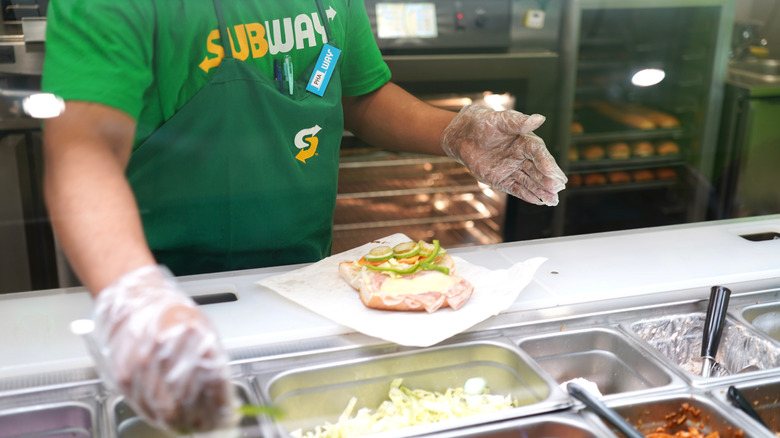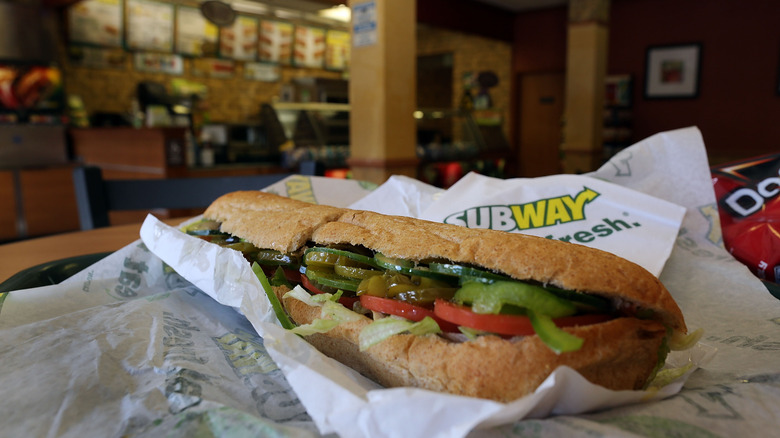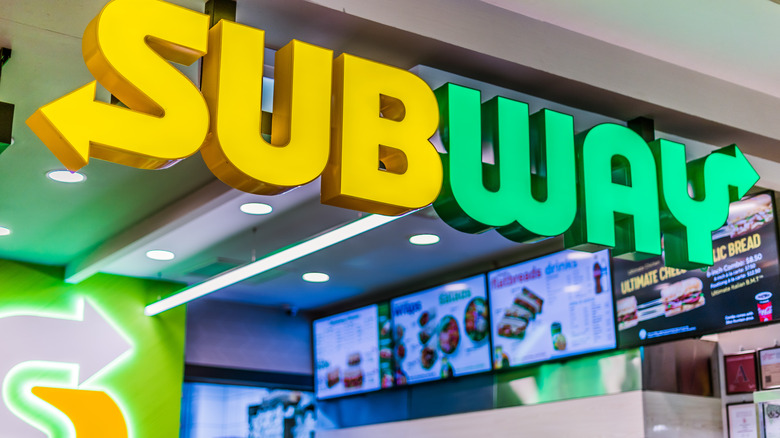The Origin Story Of Subway
Love it, hate it, or somewhere in between, you have to admit, at some point or another in your life, Subway has been there for you. And no, not an underground train system; we're talking about what is likely America's most famous sub sandwich chain.
Its ubiquity has meant many of us have found ourselves popping into a Subway for a reliable turkey breast sub when time is of the essence, or other options simply do not abound. Or, maybe, it's your favorite fast food spot, and you'll aggressively hunt down a location to satisfy your craving for a warm sweet onion chicken teriyaki. These are all acceptable motives.
Speaking of the seeming omnipresence of Subway, your eyes are not playing tricks on you. According to QSR Magazine, Subway blows its sandwich category competition out of the water when it comes to the sheer number of locations. As of 2021, Subway boasts an almost unbelievable 21,147 franchise locations; the runner-up is Arby's, with a comparatively paltry 3,409 stores.
So, how did this come to pass? What are the origins of the sandwich chain that is found everywhere, from high schools to Baptist churches?
$1,000 dream
Subway owes its start to nuclear physics, but don't worry about the Roentgens in your steak and cheese. The story goes back to 1965, says Subway in their official history. It was then that 17-year-old Fred DeLuca was facing the dilemma of how to pay for his college education. He turned to family friend Dr. Peter Buck, a nuclear physicist employed in the energy sector, for advice. Buck, according to the New York Times, remembered a popular sub shop from his youth and suggested it might be a good business for the young DeLuca. He even seeded the venture with a $1,000 loan.
The shop was originally known as Pete's Super Submarines, opening in Bridgeport, CT. On their opening day, they sold out of their signature item, the foot-long sub sandwich, then priced at 69 cents. One problem, though, was the name. Customers often misheard it, so DeLuca and his Buck settled on the less-confusing moniker Pete's Subway, which was eventually shortened to simply Subway.
Growing fast
By 1966, the partners had formed Doctor's Associates, a holding company for Subway's assets, reports The Washington Post. The name is a reference to both Buck's Ph.D. and the desire — at the time — DeLuca had to become a doctor.
It was in 1974 that Doctor's Associates began franchising Subway locations. Speaking with Inc., DeLuca recounted their growth. "We didn't have any big thought process except that, OK, franchising will help us get to our goal of 32 stores and help us run stores farther away from home. It took us a really long time to learn the franchise business, because we started out with a blank slate. We didn't have any franchising coaches or advisers."
By 1982, Subway had grown to 200 locations and set a goal of 5,000 locations by 1994. Spurring that growth was Subway's relatively-low franchise fee of $5,000 and minimal construction costs. They also initiated a program that offered cash incentives to franchisees that opened new stores and helped support their fellow franchisees. They surpassed their goal ahead of schedule, with 5,144 locations open by 1990.
Looking to the future, Subway hopes to grow even further, and they have launched a new strategic plan that outlines their vision. As Food Business News reports, that includes modernizing their restaurants, focusing on quality over quantity, and attracting experienced franchisees who share their growth-focused mindset.


